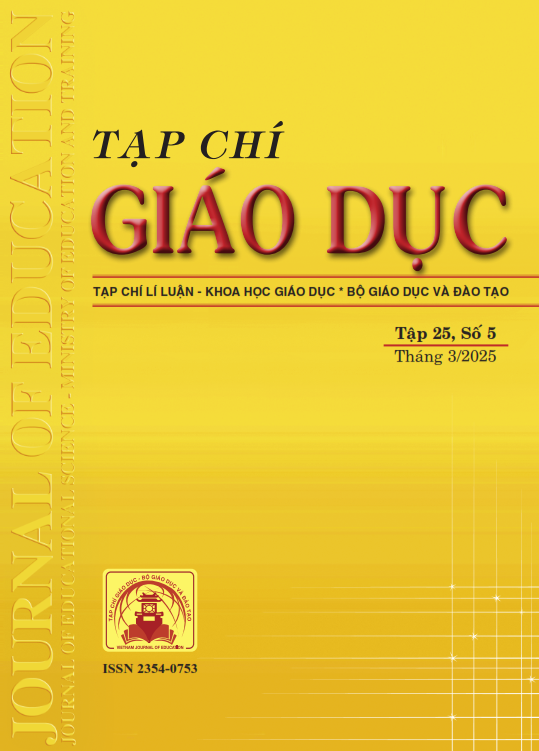Khai thác và sử dụng một số công cụ trí tuệ nhân tạo (AI) trong dạy học môn Khoa học tự nhiên
Tóm tắt
The explosion of information technology and artificial intelligence worldwide, particularly in Vietnam, has profoundly impacted industries, especially education. The article examines the application of artificial intelligence (AI) in teaching Natural Sciences, focusing on supporting tools such as ChatGPT, Gamma AI, Gemini AI, Napkin AI, etc. Through theoretical analysis and pedagogical experiments, the article shows that AI not only helps personalize learning and enhance interactions but also facilitate teachers in designing lectures and creating richer, more diverse, and creative learning activities, eventually promoting students’ engagement and learning effectiveness. Also, the article proposes a specific process to exploit the potential of AI in designing teaching scenarios, promoting innovation in teaching methods, and contributing to improving the quality of teaching Natural Sciences in particular and the quality of teaching in general. This research advocates AI application in teaching Natural Sciences, thereby facilitating innovation in teaching methods, improving education quality and optimizing learning experiences for students.
Tài liệu tham khảo
Abdullah, M., Madain, A., & Jararweh, Y, (2022). ChatGPT: Fundamentals, applications, and social impacts. In 2022 Ninth International Conference on Social Networks Analysis, Management and Security (SNAMS), pp. 1-8, IEEE.
Akgun, S., & Greenhow, C. (2021). Artificial intelligence in education: Addressing ethical challenges in K-12 settings. AI and Ethics, 2(4), 431-440.
Baidoo-Anu, D., & Ansah, L. O. (2023). Education in the era of generative artificial intelligence (AI): Understanding the potential benefits of ChatGPT in promoting teaching and learning. Journal of AI, 7(1), 52-62.
Baidya, M., & Kumar, C. A. (2024). Artificial intelligence in education: Understanding benefits, limitations, and prospects for the future. International Journal for Multidisciplinary Research, 6(2), 1-9. https://doi.org/10.36948/ijfmr.2024.v06i02.16699
Bộ GD-ĐT (2018). Chương trình giáo dục phổ thông môn Khoa học tự nhiên (ban hành kèm theo Thông tư số 32/2018/TT-BGDĐT ngày 26/12/2018 của Bộ trưởng Bộ GD-ĐT).
Chassignol, M., Khoroshavin, A., Klimova, A., & Bilyatdinova, A. (2018). Artificial Intelligence trends in education: A narrative overview. Procedia Computer Science, 136, 16-24.
Chen, L., Chen, P., & Lin, Z. (2020). Artificial intelligence in education: A review. IEEE Access, 8, 75264-75278. https://doi.org/10.1109/access.2020.2988510
Dedić, N., & Stanier, C. (2017). Towards differentiating business intelligence, big data, data analytics and knowledge discovery. In Innovations in Enterprise Information Systems Management and Engineering: 5th International Conference, ERP Future 2016-Research, Hagenberg, Austria (pp. 114-122). Springer International Publishing.
Đinh Thị Mỹ Hạnh, Trần Văn Hưng (2021). Trí tuệ nhân tạo trong giáo dục: cơ hội và thách thức đến tương lai của việc dạy và học ở trường đại học. Tạp chí Khoa học và Công nghệ, Đại học Đà Nẵng, 19(2), 38-42.
Holmes, W., & Bialik, M. (2019). Artificial Intelligence in Education. Promise and Implications for Teaching and Learning. Publisher: Center for Curriculum Redesign.
Kay, J. (2015). Whither or wither AI of AIED?. Seventeenth International Conference on Artificial Intelligence in Education (AIED 2015 Workshop Proceedings), 4(85) (pp. 1-10).
Li, H. (2023). AI in Education: Bridging the Divide or Widening the Gap? Exploring Equity, Opportunities, and Challenges in the Digital Age, Advances in Education. Humanities and Social Science Research, 8(1), 355-360.
Mikropoulos, T. A., & Natsis, A. (2011). Educational virtual environments: A ten-year review of empirical research (1999-2009). Computers & Education, 56(3), 769-780.
Nguyễn Duy An (2021). Ứng dụng trí tuệ nhân tạo trong việc dạy học ở trường đại học tại Việt Nam. Kỉ yếu Hội thảo “Chuyển đổi số: Cách tiếp cận lấy người học làm trung tâm ứng dụng trong phương pháp dạy học kết hợp”, Trường Đại học Ngoại ngữ - Tin học Thành phố Hồ Chí Minh, 484-492.
Nkechi, A. A., Ojo, A. O., & Eneh, O. A. (2024). Impact of Artificial Intelligence in Achieving Quality Education. https://www.intechopen.com/chapters/1181881
Popenici, S. A., & Kerr, S. (2017). Exploring the impact of artificial intelligence on teaching and learning in higher education. Research and Practice in Technology Enhanced Learning, 12(1), 22. https://doi.org/10.1186/s41039-017-0062-8
Rus, V., D’Mello, S., Hu, X., & Graesser, A. (2013). Recent advances in conversational intelligent tutoring systems. AI Magazine, 34(3), 42-54.
Sharma, R. C., Kawachi, P., & Bozkurt, A. (2019). The landscape of artificial intelligence in open, online and distance education: Promises and concerns. Asian Journal of Distance Education, 14(2), 1-2.
Sok, S., & Heng, K. (2023). ChatGPT for education and research: A review of benefits and risks. Cambodian Journal of Educational Research, 3(1), 110-121.
Tang, K. H. D. (2024). Implications of artificial intelligence for teaching and learning. Acta Pedagogia Asiana, 3(2), 65-79. https://doi.org/10.53623/apga.v3i2.404
Wartman, S. A., & Combs, C. D. (2018). Medical education must move from the information age to the age of artificial intelligence. Academic Medicine, 93(8), 1107-1109.
Zhai, X. (2023). ChatGPT User Experience: Implications for Education. http://dx.doi.org/10.2139/ssrn.4312418
Zhai, X., Yin, Y., Pellegrino, J. W., Haudek, K. C., & Shi, L. (2020). Applying machine learning in science assessment: a systematic review. Studies in Science Education, 56(1), 111-151.
Tải xuống
Đã Xuất bản
Cách trích dẫn
Số
Chuyên mục
Giấy phép

Tác phẩm này được cấp phép theo Ghi nhận tác giả của Creative Commons Giấy phép quốc tế 4.0 .












